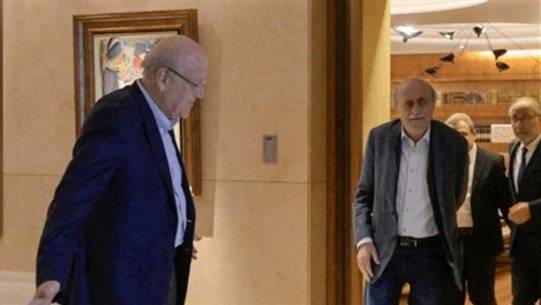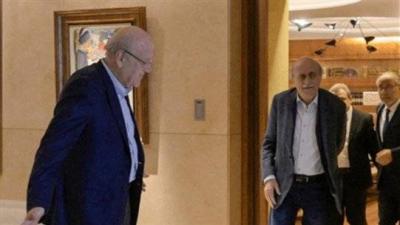It seems that the government has become a thing of the past. The ongoing efforts and preparations for the upcoming phase, in anticipation of the expected presidential vacuum, serve as evidence for such a conclusion. This is evident through the visit of Progressive Socialist Party leader Walid Jumblatt to the caretaker Prime Minister Najib Mikati, followed by Mikati's meeting with Speaker of the Parliament Nabih Berri. The aim of this movement is to prepare for the next stage where the current government, as a caretaker administration, will assume presidential powers in agreement with the parliamentary presidency and the head of the Socialist Party.
Just the thought of this will place the two presidents and the leader in a position that undermines the stature of the Maronite President and allows a trio of Muslims to take the initiative in governance while the Christian partner is absent and marginalized. This reality will collectively put them in the dock and expose them to attacks from President Michel Aoun and the Free Patriotic Movement. Aoun's departure from Baabda means opening the doors to opposition against the Mikati government and starting discussions about undermining powers, trio arrangements, and other positions that align with this direction.
Since Speaker Berri's famous speech on the anniversary of August 31, the relationship between him and the presidency has broken down. He quickly rejected the idea of appointing six ministers in Mikati's government to reinstate it, effectively shutting the door on the proposals of Gibran Bassil and others. His hint that the recent meeting involving Aoun and Mikati was negative indicates that agreement with Aoun's presidency is impossible.
Berri, in agreement with Jumblatt and Mikati, has closed the doors to the presidency before October 31, even though he is unable to convene a session to elect a president, as there are no candidates or serious names in sight. The only candidate, Sulieman Frangieh, head of the Marada Movement, who left for an extended trip abroad, faces rejection from Gibran Bassil, leaving Hezbollah unable to endorse a candidacy that lacks support from a substantial Christian bloc.
So, what now? There is no solution nor anyone working to formulate one. The key actor, Hezbollah, claims to have previously initiated contact with the concerned parties and provided sufficient initiatives for one of them to succeed, yet doors have been shut in its face, leaving it unable to reconcile Bassil and Mikati. Hezbollah is not part of the Berri-Mikati-Jumblatt bloc and has no idea what they are pursuing. The prospects for a new government or the presidency are not promising.
Lebanon has reached a serious state of collapse amidst institutional dysfunction and deterioration. From the perspective of the trio of Berri, Mikati, and Jumblatt, the solution lies in finding a mechanism to manage public affairs and ensure the state's minimum requirements. This could involve each minister fulfilling their designated role; for instance, raising customs dollar rates or electricity tariffs can be executed by the relevant minister. Therefore, there are matters that can be handled through ministerial decisions. Conversely, Berri will open the doors of the parliament to issue decisions and legislation to facilitate the work of the caretaker government, all under the umbrella of the law and constitution, and through the ruling of legislator Hassan Al-Rafai and articles 62 and 75 of the constitution.
Berri insists on activating the legislative council, asserting that the parliament is its own master, especially as there are no presidential candidates after and the local and regional atmospheres have not yet cleared. Mikati considers that an agreement with Aoun has become impossible and that the constitution allows his government to perform its caretaker functions. As for Jumblatt, his analysis indicates that as long as Hezbollah has not intervened yet, the crisis is open to all possibilities; he has previously called for Hezbollah to intervene to resolve the government situation and press for the formation of a new government.
In the presidential matter, Jumblatt is bothered by the ambiguity surrounding the presidential file, as there are no serious candidates other than Frangieh. The danger we observe today is that the horizon of the political game could drive the country to the abyss, with no party willing to concede or meet the other halfway. The fact is that the citizen is the only one paying the price while those responsible for the country engage in a battle of existence and unclear political confrontations. The current reality could end in a political or security explosion. In the past, friendly countries used to address the issue and take the solution upon themselves. However, today, all countries are preoccupied with their own concerns, even the nurturing mother.
Thus, we are witnessing a three-dimensional movement in a time of delay to alleviate burdens to the extent possible, as neither Berri nor Mikati see any hope, no matter how small, for forming a government. So, let them "manage from what exists," even if it's a caretaker and resigned government, and let each minister perform their duty. But the question remains: will Aoun, in his remaining days, accept to be bypassed while they govern? And how will the other Christian forces react if the Christian party is removed from the equation? Moreover, how will Berri, Mikati, and Jumblatt confront such an attack against them?




